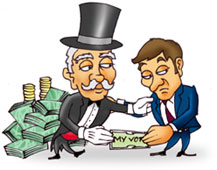Politico is reporting that Rep. Fred Upton (R-MI) and other members of his staff recently met in a closed door meeting with lobbyists from the dirty energy industry. As reported earlier, Upton is the new Chairman of the House Energy and Commerce Committee, and has taken an adversarial stand against the Environmental Protection Agency.
Also attending the meeting was Senator Jim Inhofe (R-OK), the ranking Republican on the Senate Environment and Public Works Committee, and perhaps the most well-known and loudest global warming deniers in Congress.
According to the report from Politico:
“The roster of those attending the invitation-only gathering is being kept under lock and key, though it is believed to include the American Petroleum Institute, National Mining Association, National Rural Electric Cooperative Association, U.S. Chamber of Commerce, and others.”
At the start of this year, the EPA began regulating carbon and other greenhouse gas emissions, a move that has industry leaders worried that they might have to fork over profits in order to meet new industry standards. The Hill reported yesterday that Upton is looking to introduce a bill within the next week to strip the EPA of their new powers.
But other Republican members want to go even further than Upton. Rep. John Barrasso (R-WY) plans on introducing a bill that would prohibit any federal agency from regulating greenhouse gas emissions unless Congress specifically passes a bill that gives these agencies the authority to do so. Given the assault on the environment that is already taking place among the new Republican majority in the House, passing a bill that allows tougher environmental regulations seems like a long shot.
While the details of the secret industry meeting are being kept secret, there should be little doubt that the energy industry is once again going to be playing a major role in crafting legislation that will affect their industry.
The secrecy surrounding these GOP meetings with dirty energy interests harkens back to the closed door meetings that former vice president Dick Cheney held with energy industry officials in the spring and summer of 2001 before pushing Congress to ease rules and regulations that he believed were strangling the industry.
Subscribe to our newsletter
Stay up to date with DeSmog news and alerts







